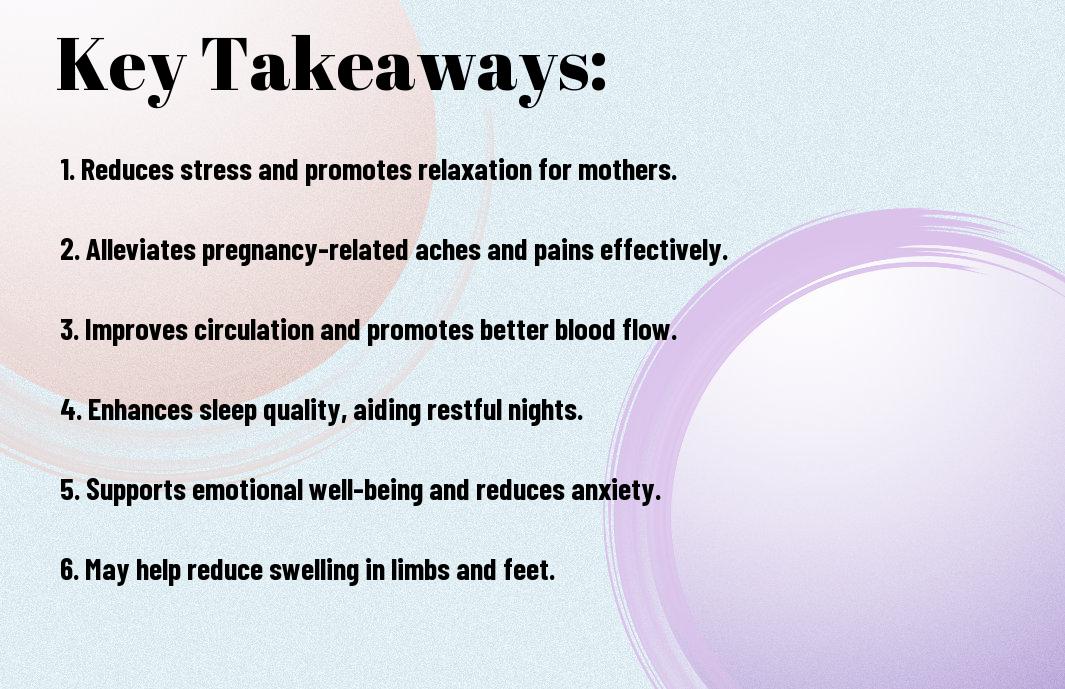It’s important to understand how prenatal massage can positively impact your pregnancy journey. As an expecting mother, you may experience various physical and emotional changes, and prenatal massage offers a therapeutic solution to alleviate discomfort and promote relaxation. This specialized massage therapy focuses on your unique needs during pregnancy, helping to ease muscle tension, reduce swelling, and improve your overall well-being. To explore more about this topic, check out The Benefits of Prenatal Massage Therapy.
Key Takeaways:
- Relief from Discomfort: Prenatal massage helps alleviate common pregnancy-related issues like back pain, swelling, and muscle tension.
- Improved Circulation: This type of massage enhances blood flow, which can benefit both the mother and the developing fetus.
- Stress Reduction: Prenatal massage promotes relaxation and can reduce anxiety, contributing to a healthier mental state for expecting mothers.
- Better Sleep: Regular sessions can help improve sleep quality, making it easier for mothers-to-be to cope with the demands of pregnancy.
- Preparation for Labor: Certain techniques in prenatal massage may aid in preparing the body for labor and delivery by relaxing muscles and reducing tension.
Understanding Prenatal Massage
A prenatal massage is a specialized form of therapy designed to address the unique needs of expectant mothers. This therapeutic technique aims to alleviate common discomforts associated with pregnancy, such as back pain, swelling, and tension. By promoting relaxation and improving circulation, prenatal massage can enhance your overall well-being during this transformative time in your life.
Definition and Techniques
On a fundamental level, prenatal massage involves gentle, non-invasive techniques tailored to accommodate your changing body. Therapists utilize a variety of methods, including Swedish massage, deep tissue work, and specific acupressure points, all aimed at relieving stress and tension. Special pillows and cushions can be used to provide extra support and comfort while ensuring that you are positioned safely throughout the session.
Safety Considerations
Among the many benefits of prenatal massage, safety remains a top priority. It’s imperative to consult your healthcare provider before beginning any massage therapy, especially during the first trimester when the risk of complications may be higher. Also, choosing a therapist who specializes in prenatal techniques ensures that the treatment is safe and effective for you and your growing baby.
For instance, qualified prenatal massage therapists are trained to avoid certain pressure points and techniques that could pose risks during pregnancy. They should also be mindful of your comfort levels and any specific conditions you may have, such as gestational diabetes or preeclampsia. Ensuring a safe environment with proper positioning and cushioning can enhance your experience, allowing you to relax and reap the full benefits of the massage.
Physical Benefits of Prenatal Massage
Some of the many physical benefits of prenatal massage include relief from stress, reduced muscle tension, and improved overall wellness. As your body undergoes significant changes during pregnancy, massage therapy can help support your physical health, allowing you to navigate this transformative time with greater ease and comfort.
Alleviating Common Discomforts
Massage is an effective way to alleviate common discomforts associated with pregnancy, such as back pain, swollen feet, and headaches. By targeting specific areas of tension, massage helps ease muscle strain and promote relaxation, making your pregnancy journey more enjoyable.
Improving Circulation
Physical benefits also encompass improved circulation, which is crucial for both you and your baby. Enhanced blood flow increases oxygen and nutrient delivery to your growing baby while flushing out toxins from your system.
It is vital to maintain healthy circulation during pregnancy, as it helps to manage the swelling and discomfort often experienced in your limbs. Improved circulation can also reduce the risk of complications like gestational hypertension and ensure that your body is functioning optimally, which ultimately benefits your developing child. Through prenatal massage, you can enhance your circulatory health, promoting overall well-being throughout your pregnancy.
Emotional and Psychological Benefits
To navigate the unique emotional landscape of pregnancy, you can benefit greatly from prenatal massage. This therapeutic practice fosters a sense of calm and well-being, helping you to embrace the numerous changes your body is undergoing. By incorporating prenatal massage into your routine, you nurture both your mental and emotional health, providing a holistic approach to your pregnancy journey.
Reducing Stress and Anxiety
Above all, prenatal massage is an excellent way to reduce stress and anxiety levels. The gentle techniques involved in massage promote relaxation, allowing you to let go of the daily worries that may accompany pregnancy. As you experience reduced tension, your body releases endorphins, which naturally boost your mood and help create a calmer mental space.
Enhancing Sleep Quality
Between physical discomfort, hormonal changes, and emotional fluctuations, getting quality sleep can be a challenge during pregnancy. Prenatal massage can play a significant role in enhancing your sleep quality by promoting relaxation in your mind and body. This restorative practice helps ease the tensions that may keep you awake, paving the way for more restful nights.
At the same time, improved sleep quality can have a positive impact on your overall well-being. By fostering relaxation and reducing discomfort, prenatal massage can lead to deeper, more restorative rest. As you cultivate better sleep patterns, you may find yourself feeling more energized and better equipped to handle the demands of pregnancy, ultimately enhancing your experience as an expecting mother.
Benefits for Labor and Delivery
Not only does prenatal massage soothe discomfort during pregnancy, but it also enhances your experience during labor and delivery. By integrating massage techniques, you can reduce anxiety and establish a deeper connection with your body, ultimately leading to a more positive birthing experience.
Preparing the Body
For optimal labor, prenatal massage helps prepare your body by relaxing tight muscles and alleviating tension. This increased flexibility and circulation can make contractions more manageable and may even help in positioning your baby properly for delivery.
Supporting Pain Management
Between the physical demands of labor and the emotional stress that often accompanies it, effective pain management is imperative for you. Prenatal massage techniques can provide relief by targeting specific muscle groups and promoting the release of endorphins, your body’s natural painkillers.
Supporting your pain management during labor is vital for a more comfortable experience. By focusing on areas such as the lower back, hips, and shoulders, massage therapy can alleviate muscle tension and enhance relaxation. Additionally, breathing techniques used during massage can further aid in pain control. Ultimately, incorporating massage into your birth plan may empower you to navigate the challenges of labor more effectively, helping you remain centered and in control.
Choosing the Right Practitioner
For expecting mothers, selecting the right prenatal massage practitioner is important for a safe and effective experience. Look for a therapist who specializes in prenatal massage and is experienced in working with pregnant clients. Take your time to research practitioners in your area, read reviews, and seek personal recommendations to ensure you find someone who meets your specific needs.
Qualifications and Certifications
On your journey to find the right practitioner, it’s important to verify their qualifications and certifications. Look for therapists who have completed specialized training in prenatal massage, as this ensures they understand the unique needs and considerations for pregnant women. Proper certification demonstrates their commitment to safe practices and effective techniques tailored for your comfort and well-being.
Questions to Ask
Questions about your practitioner’s experience and approach to prenatal massage can help you gauge their suitability for your needs. Ask how long they’ve been practicing, what specific training they’ve completed in prenatal care, and how they tailor their techniques for expectant mothers. Ensuring open communication helps establish trust and comfort, which are vital for a positive experience.
But don’t stop at just those questions; feel free to ask about their understanding of common pregnancy-related issues and how they address them during sessions. Inquire about their massage techniques and any modifications they may make based on your evolving needs throughout pregnancy. This dialogue ensures you feel confident and comfortable throughout your pregnancy journey.
Frequency and Duration of Sessions
Keep in mind that the frequency and duration of prenatal massage sessions can greatly impact your overall experience. It is typically recommended to have sessions once a month during the first trimester, moving to bi-weekly or weekly sessions in the second and third trimesters as your body undergoes more significant changes. Each session generally lasts between 60 to 90 minutes, allowing ample time for relaxation and targeted relief.
Recommended Schedule
Below is a general guideline for scheduling your prenatal massages. During your first trimester, aim for one session each month. In the second trimester, consider increasing this to every two weeks, and during the third trimester, weekly sessions may be beneficial. This schedule can be adjusted based on your specific needs and how your body responds.
What to Expect in a Session
For your prenatal massage session, you can expect a warm, calming environment that promotes relaxation. Your therapist will use specially designed pillows and techniques to ensure your comfort and safety while targeting the areas that need relief, such as your lower back, hips, and legs.
With each session tailored to your individual needs, you’ll likely experience various techniques aimed at alleviating discomfort associated with pregnancy. Your therapist may incorporate gentle stretching, pressure point work, or even light stroking motions to enhance circulation and reduce tension. Feel free to communicate any specific concerns or areas you’d like them to focus on to receive the most benefit from your experience.
Summing up
Considering all points, prenatal massage offers a range of benefits that can enhance your experience during pregnancy. By alleviating discomfort, reducing stress, and improving circulation, this specialized form of massage can help you feel more relaxed and connected to your body. Additionally, it may promote better sleep and prepare you for labor by easing tension and discomfort. Incorporating prenatal massage into your self-care routine can be a valuable tool for nurturing both your emotional and physical well-being as you prepare for motherhood.
Q: What are the primary benefits of prenatal massage for expecting mothers?
A: Prenatal massage offers numerous benefits for expecting mothers. It can help reduce common discomforts such as lower back pain, hip pain, and leg cramps which many women experience during pregnancy. The therapy promotes relaxation, which can lower the levels of stress and anxiety that often accompany this transformative period. Additionally, prenatal massage can improve circulation, leading to better nutrient and oxygen delivery to both the mother and baby. Overall, it fosters a sense of well-being that is beneficial for both physical and emotional health.
Q: Is prenatal massage safe for all stages of pregnancy?
A: Generally, prenatal massage is safe for women in all stages of pregnancy, but it is necessary to consult with a healthcare professional before scheduling a session, especially if there are any underlying medical conditions or complications. Most therapists trained in prenatal massage will modify techniques and positions based on the stage of pregnancy to ensure the safety and comfort of the mother and fetus. Typically, sessions are especially beneficial during the second and third trimesters when physical discomfort may increase.
Q: How often should expecting mothers get prenatal massages for optimal benefits?
A: The frequency of prenatal massages can vary based on the individual’s needs and preferences. Some women may benefit from a massage once a month in the early stages of pregnancy, while others may choose to have weekly sessions as they progress into the later stages. Listening to one’s body and discussing any specific concerns with a knowledgeable therapist can help determine the best schedule. Regular sessions can help manage stress, alleviate pain, and enhance the overall pregnancy experience.





